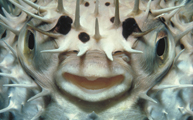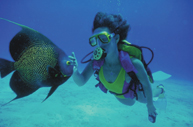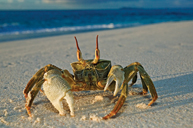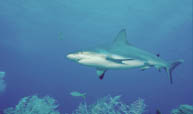The fishy business of marine preservation
The fishy business of marine preservation McGill University
User Tools (skip):
The fishy business of marine preservation
McGillians hope to spread coral reefer madness

Though cute, the protective spines of the bridled burrfish Chilomycterus antennatus make it less than cuddly.
When Ian Popple worked as a research scientist at the McGill Bellairs Institute in Barbados, he would take students snorkeling and show them around the coral reef. The enthusiastic teacher often found his group of about 15 swelling to 30 as passers-by joined to overhear his explanations of reef life: the habits of colourful fish, the growth patterns of coral, how the members of the ecosystem interact.
Some years later, now a communications officer with the McGill University Health Centre, Popple is taking a two-month leave to travel to Grenada and also back to Barbados to set up scientific dive courses with Beautiful Oceans, an educational program he founded with Stephan Becker. The two met in Barbados when Becker was doing coursework for his McGill Diploma in Environmental Studies.
Becker had been looking for a way to integrate his business background with his diploma and his deep care for environmental matters. He considered starting an NGO, but noted that they're always struggling for money. "There are so many good people doing good work who are underfunded," he says. "If you use business and marketing to give back to the community and do it right, that should be rewarded."
Popple and Becker offer online courses for divers and snorkellers who want to explore coral reefs. Would-be marine biologists can log in and check out the illustrations, watch videos of reef squid and damselfish, and read about the environment.

A diver mingles with a French angelfish Pomacanthus paru.

A ghost crab Ocypode quadrata stares down the photographer.
Then, by diving at an affiliated centre with Beautiful Oceans' science divers, tropical vacations become a rich learning experience and tourists leave with a better appreciation of the coral reefs and their environmental challenges. And by certifying local dive instructors to lead Beautiful Oceans dives, business fees go directly into the community's economy.
"We've been working like cleaner shrimp on a huge turtle for a year and a half," says Becker about the time spent developing the courses. The information has to be tailored to a smart lay audience. "We want tourists and locals to open up the book and go ‘Wow, this is fun to read.' It's not the same as teaching fourth-year students who have an extensive biology background," Popple says. They distilled the information to the bare bones and made the learning fun by adding online quizzes, virtual classrooms, and providing headphones and a forum for all students so they can interact with one another. "We want to give a broad overview and links to conservation, while addressing some of those fundamental questions like Why is the sea salty? Why do fishes school? How do sea urchins figure out where they are going?"
It's a good bet that most novice divers don't even know sea urchins "go" anywhere. But watching short videos of small yellow French grunt, velvety dark black durgons, nervous little fairy basslets, and Carribbean reef squid would make anyone want to dive right in and explore the curious underworld.
And why not get them young? Beautiful Oceans has just announced a partnership with Disney to work on a "Nemo and His Friends" computer game for kids to learn about coral reefs and their inhabitants.

A cruising Caribbean reef shark Carcharhinus perezi does just about anything it wants.
Coral reefs are often called the rainforests of the ocean because the number of living organisms rivals that of the terrestrial ecosystem. Tens of thousands of species depend on coral reefs, including 4,000 kinds of fish. Though reefs make up less than one percent of the world's oceans, they house nearly a quarter of all known marine life. Too bad that in the past decade alone, 25 percent of coral reefs have been destroyed.
As fun as the work may be, Popple and Becker are also on a mission. They believe that understanding coral reefs is the first step toward conserving this ecosystem. They've seen tourists feed dog food to green turtles causing them to be almost too fat to swim, and some studies show that divers can damage reef formations. "Even under optimum conditions coral reefs grow incredibly slowly — from less than one cm per year to a maximum of around 10 cm per year for the fastest species. If humans built this slowly, the Empire State Building would have taken around 10,000 years to complete," Popple says. Better information will lead to better respect for the environment.
Beautiful Oceans will contribute to conservation efforts including the Marine Conservancy, a not-for-profit organization established by the founders of Beautiful Oceans. The conservancy will give back to communities by investing in education programs and boosting coral-reef-friendly projects such as environmental boat moorings, helping establish and manage Marine Protected Areas, and developing artificial reefs to support biodiversity whose habitat has been damaged.
Beautiful Oceans is the first Montreal company to join 1% for the Planet. Members of this business alliance are committed to donating one percent or more of their net revenue to environmental organizations.
When working on their business plan, Becker and Popple drew on their community based in Montreal. Their advisory committee includes Brenda Plant, corporate social responsibility advisor and sessional lecturer at McGill, and Mathieu Régnier, Environmental Policy Consultant at the UN Environment Program Secretariat for the Convention of Biological Diversity, based in Old Montreal. Henri Valles, completing his PhD at McGill in marine biology, is based in sunny Barbados.
Becker's vision is to help change how tourism centres do business. "Through time, Beautiful Oceans could provide branding for environmentally friendly dive centres," he says.

